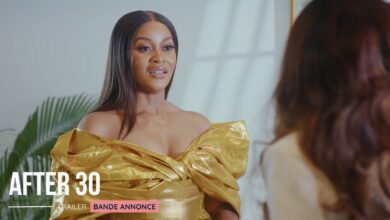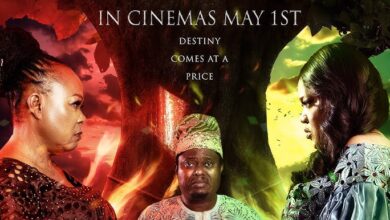The Story⚡
The AMVCA 2025 had its fair share of glitz, glamour, and glaring missteps. From unexpected wins to awkward moments on stage, this piece evaluates everything that went down at Africa’s biggest night in film and television.

Tell Me More
The Africa Magic Viewers’ Choice Awards (AMVCA) 2025 marked its eleventh edition with a blend of spectacle, suspense, and stumbles. Held on May 10, 2025, in the heart of Lagos, the star-studded ceremony brought together the biggest names in African film and television, from seasoned legends to fresh trailblazers. As always, the event celebrated the brilliance, creativity, and resilience of African storytellers, honoring everyone from screenwriters and directors to editors, costume designers, and sound engineers.
Following the nomination announcement on March 23, expectations soared. Film enthusiasts and industry watchers campaigned, debated, and eagerly awaited the big night, rooting for their favorite stars and projects to take home the golden trophy. The stage was set for celebration and for surprises.
And surprises there were. The night unfolded with jaw-dropping wins, heartbreaking snubs, and awkward moments that left many viewers talking long after the credits rolled. While the AMVCA delivered on its usual glitz and red-carpet glam, it also left behind some lessons, some laughs, and no shortage of online reactions. Let’s break it all down together: the highs, the lows, and the moments that sparked conversations.
1. Analysis of Good Wins
Without much debate, we can agree that most of the titles that made it onto the nomination list, especially among Nollywood productions, were films that deeply resonated with audiences. These selections were not only popular but also technically and artistically strong, showcasing excellence in storytelling, cinematography, musical scoring, costume design, and more. Still, while each category was packed with outstanding contenders, only one winner could emerge.
The big question, then, is: did the wins reflect merit?
Femi Adebayo’s Seven Doors stood out, winning both the Best Lead Actor and Best Lead Actress categories — honors that went to Femi Adebayo and Chioma Chukwuka, respectively. These wins were well-deserved. Both actors delivered compelling performances that carried the emotional weight of Oba Adedunjoye’s tragic and poignant story. Chioma, despite acting in a Yoruba-language film, convincingly portrayed the Igbo wife of a Yoruba king, a testament to her versatility and skill.

Femi Adebayo shared his category with another stellar performance by Lateef Adedimeji in Lisabi: The Uprising. While Adebayo took home the award, Adedimeji’s portrayal of the heroic Lisabi, a legendary figure from Egba history, was equally commendable. The film’s cultural depth and production quality did not go unrecognized, as Lisabi clinched the award for Best Indigenous Language Film (West Africa).

Equally deserving was Blessing Uzzi, who bagged both the Best Movie and Best Writer (Movie) awards. Her film, directed by Afolabi Olalekan, follows a rideshare app for Lagos motorcyclists and its turbulent clash with corruption. The narrative, weaving together multiple characters affected by violence and injustice, was bold, timely, and well-crafted. It’s no surprise that the title also won the Ambitious Work Jury Prize at the 2024 Africa International Film Festival.
The Trailblazer Award went to Kayode Kasum, and few would argue its merit. Known for a portfolio of diverse and compelling films (including This Lady Called Life, Sugar Rush, Fate of Alakada, Kambili: The Whole 30 Yards, Soole, Obara’M, Áfàméfùnà: An Nwa Boi Story, Something Like Gold, and many more), Kasum has consistently contributed to the vibrancy of Nigerian cinema. This award rightly acknowledges his rising influence and creative output.
Lastly, the Industry Merit Awards, presented to Sani Mu’azu and Nkem Owoh, were fitting tributes to two veterans whose work has helped shape Nigerian film. Representing Northern and Eastern Nigeria, respectively, both actors have made enduring contributions to the industry’s growth and legacy.
2. Surprise Win for Trailblazer Award
Kayode Kasum’s recognition as the 2025 Trailblazer Award recipient was a pleasant surprise, not due to any lack of merit on his part, but because many expected the honor to go to a fresher face in the industry. Known for his vibrant, genre-spanning filmography, Kasum has undeniably contributed to the growth of Nigerian cinema, with titles like This Lady Called Life, Soole, Obara’M, and Áfàméfùnà: An Nwa Boi Story cementing his place as a creative force. His win, though widely respected, challenged the general expectation that the Trailblazer Award is reserved for relatively newer entrants still on the rise.
Traditionally, the Trailblazer Award is bestowed upon a rising star or emerging talent whose work signals a promising future and has begun to significantly shape the industry. Unlike most other categories, it is not open to public nominations but is decided solely by the award jury. Just last year, the award went to Chimezie Imo, whose performance in Breath of Life earned critical acclaim and aligned with the public’s understanding of what the Trailblazer should represent. In contrast, Kasum, while still young, is already considered an established director with several commercially and critically successful films to his name. This shift in interpretation of what “trailblazer” means, moving from up-and-coming to already-established, sparked conversations about the award’s evolving criteria and who the AMVCA intends to spotlight with this recognition going forward.
3. Shocking Snubs and Shutouts
While some films emerged as big winners at this year’s AMVCA, Seven Doors bagging three awards and Lisabi: The Uprising clinching two, not every heavily nominated title had reason to celebrate. In fact, several anticipated contenders, despite multiple nominations, walked away empty-handed, leaving fans and industry watchers puzzled.
The most notable of these was Kunle Afolayan’s Anikulapo: Rise of the Spectre. Nominated in six categories, expectations were high for the epic spin-off, especially given the success of its predecessor, Anikulapo, which took home five awards from its sixteen nominations at the 2023 AMVCA. But in a surprising twist, the follow-up series failed to win a single award this year, a dramatic fall from grace that sparked discussions about whether it lived up to the storytelling and production value of the original.
Another unexpected shutout was Bolanle Austen-Peters’ House of Ga’a. With six nominations, the historical drama was a strong contender, particularly in the categories of Best Supporting Actor, Best Lead Actor, Costume Design, Director, Best Movie, and Best Writer. Yet it ended the night without a win — a development many did not see coming.
Other titles met similar fates. Princess on a Hill, nominated in five categories; Skeleton Coast with eight nominations; Phoenix Fury and Soft Love with three each; The Uprising: Wives on Strike 3, Roses and Ivy, and Agemo with two each, all left the ceremony unrewarded. For films that received considerable attention during the nomination announcement, their complete absence from the winner’s list left a bitter aftertaste and raised questions about the jury’s decision-making process, industry politics, or perhaps just unfortunate category pairings.
These snubs underline the high-stakes nature of the AMVCA: nominations may generate buzz, but they guarantee nothing. For filmmakers and fans alike, the outcomes served as a stark reminder that at the AMVCA, anticipation doesn’t always equal recognition.
4. Technical Glitches and a Tired Stage: The Hall Disappointments
One of the most glaring letdowns of the 2025 AMVCA was the overall execution of the show itself. While the red carpet dazzled with celebrities in eye-catching attire and photographers flashing away, the same energy and finesse failed to translate to the main event. The production hiccups were not just minor glitches. They were glaring disruptions that affected the flow, mood, and professionalism of the night.
The teleprompters frequently malfunctioned, leaving some presenters visibly confused or stranded mid-speech. At one point during the ceremony, some presenters came on stage before their scheduled turn and were asked to return backstage. All thanks to poor stage cues and coordination. These technical lapses not only robbed the evening of its elegance but also made the transitions between categories feel disjointed and sometimes painfully slow.
Perhaps most disappointing was how these errors detracted from the experience of the audience, both in the hall and at home. Award ceremonies thrive on precision and flow, building momentum from one announcement to the next. But the poor direction and backstage mismanagement at this year’s AMVCA created a sense of disarray that could not be ignored. For an event as prestigious as the AMVCA, meant to honor excellence in filmmaking, the stage management ironically lacked the very professionalism and attention to detail that the awards were celebrating.
5. Duo Hosting Style was a Miss
The hosts of any major award ceremony are meant to be the energy source of the event, guiding the show with wit, spontaneity, and charm. Unfortunately, the 2025 AMVCA hosts, IK Osakioduwa and David Oke, fell short of this expectation. While IK’s return brought a sense of familiarity, the attempt to refresh the hosting dynamic with the inclusion of David Oke, a younger and relatively fresh face, didn’t yield the desired effect. Rather than a vibrant exchange of charisma and rhythm, the duo’s banter often felt forced, with jokes landing awkwardly and commentary that barely resonated with the live audience or viewers at home.
What could have been a clever generational blend quickly turned into a long night of strained attempts at humor. In a year where the event already suffered from technical hiccups, the lack of a dynamic and engaging hosting team only amplified the sense of underwhelming execution. A prestigious night that should have celebrated African storytelling with flair and energy was instead left dragging in tone, weighed down by a hosting style that simply didn’t rise to the occasion.

6. Notable Absences Among Recipients
While the night was filled with glamour and celebration, it also witnessed the notable absence of several award recipients. Some of the night’s biggest honors were accepted on behalf of their winners. Chioma Chukwuka, who won Best Lead Actress, was absent to receive her award in person. Similarly, Iyo Prosper Adokiye, named Best Digital Content Creator, was not present. Awam Amkpa, who clinched Best Director, and veteran actor Nkem Owoh, recipient of the Industry Merit Award, were also missing from the ceremony.
Their absence slightly dimmed the immediacy of the emotional highs typically associated with acceptance speeches, especially in categories as significant as Lead Actress and Industry Merit. Still, their wins drew applause, and their contributions to the film and content space were rightfully acknowledged and celebrated, even in their absence.

In Summary
Despite the bumps and blunders that marked this year’s AMVCA, from technical lapses to disappointing hosting, we remain optimistic—not just about the show’s future production quality but even more so about the stories to come.
With several promising Nollywood titles already lighting up cinemas and streaming platforms, anticipation is high for the next wave of groundbreaking narratives, bold performances, and inventive filmmaking. If anything, this year’s edition has only sharpened our curiosity about which films will rise to the top and dominate the nomination list next year.
.
Thanks for Reading.
Shockng.com covers the big creators and players in the African film/TV industry and how they do business.
Let’s be friends on Instagram @Shockng



